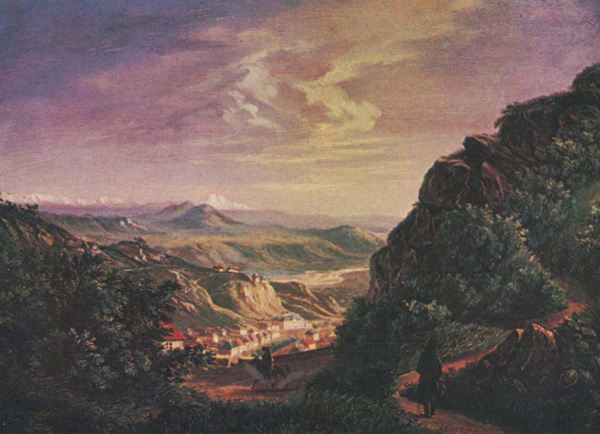Го´рные верши´ны
Спят во тьме ночно´й;
Ти´хие доли´ны
По´лны све´жей мглой;
Не пыли´т доро´га,
Не дрожа´т листы´…
Подожди´ немно´го,
Отдохнёшь и ты

Го´рные верши´ны
Спят во тьме ночно´й;
Ти´хие доли´ны
По´лны све´жей мглой;
Не пыли´т доро´га,
Не дрожа´т листы´…
Подожди´ немно´го,
Отдохнёшь и ты
Стихотворение представляет собой вольный перевод Лермонтовым известного стихотворения Гёте "Странники" из цикла «Ночные песни». Гёте написал это стихотворение в 1780 году во время вечерней прогулки по живописным лесам в Веймаре, где он служил при дворе молодого князя Карла Августа. Эти стихи были впоследствии переведены на русский язык несколько раз, в том числе Иннокентием Анненским, Валерием Брюсовым и Борисом Пастернаком. Перевод Лермонтова является самым известным. Это стихотворение было положено на музыку Александром Варламовым.
This is Lermontov’s free translation of a well-known poem by Goethe Wanderers Nachtlied II (Über allen Gipfeln) written in 1780. Goethe wrote this poem on an evening walk in the picturesque woods of Weimar, where he served at the court of the young duke Karl August. The poem was subsequently translated into Russian by several poets, including Innokenty Annensky, Valery Brusov and Boris Pasternak. Lermontov’s version is the most well known, and it was set to music by Alexander Varlamov.
«Ночно´й» and «ночь» share the common root. Can you find another adjective in the poem that is also derived from a noun?
«Верши´на» means peak. The adjective «верхний» means top. What is the shared root?
List all nouns in plural (3):
The verb «дрожа´ть» and the noun «дрожь» (f.) share a common root in Russian. Can you think of any other examples with this verb? List them her:
Find the example of Imperative mood: